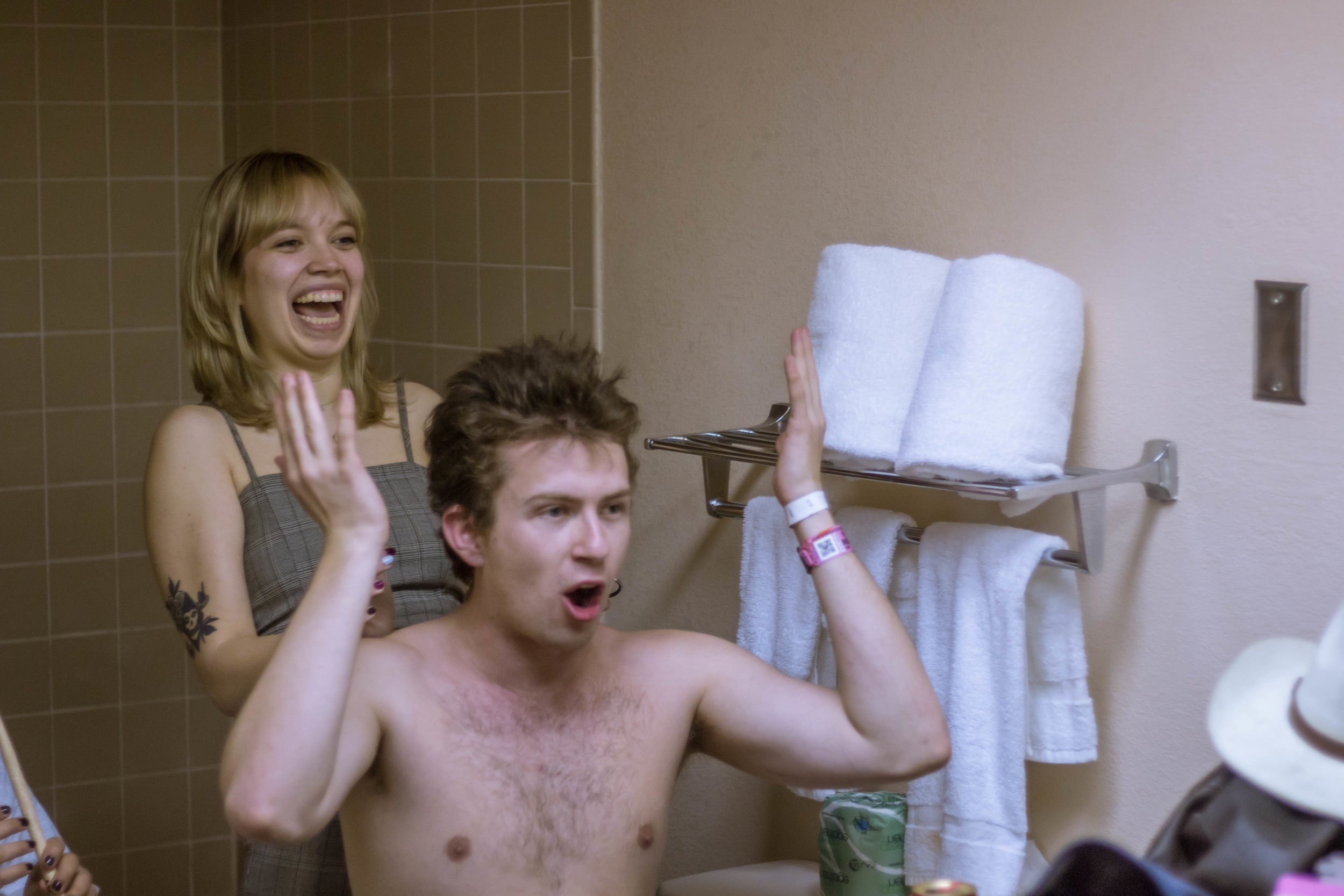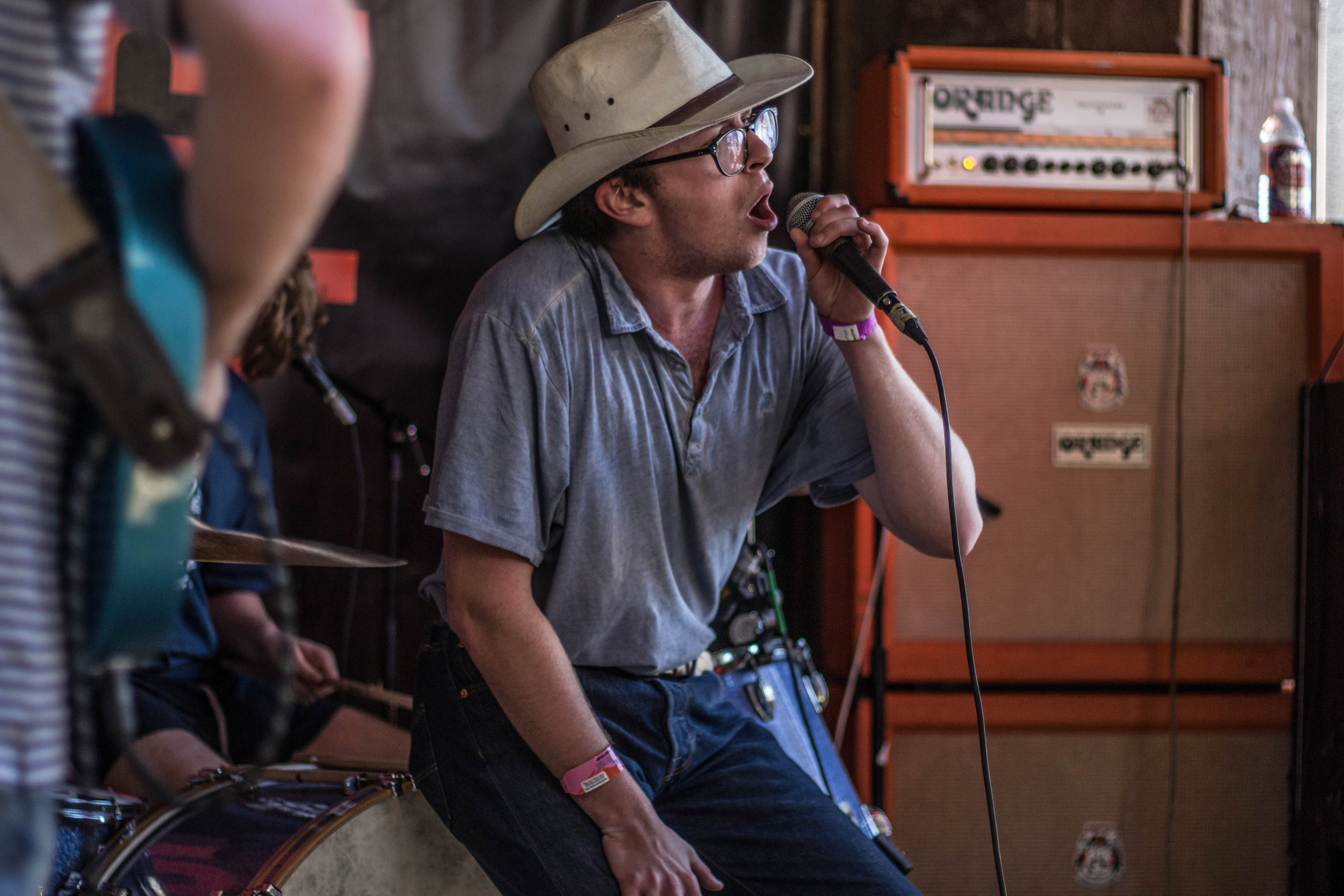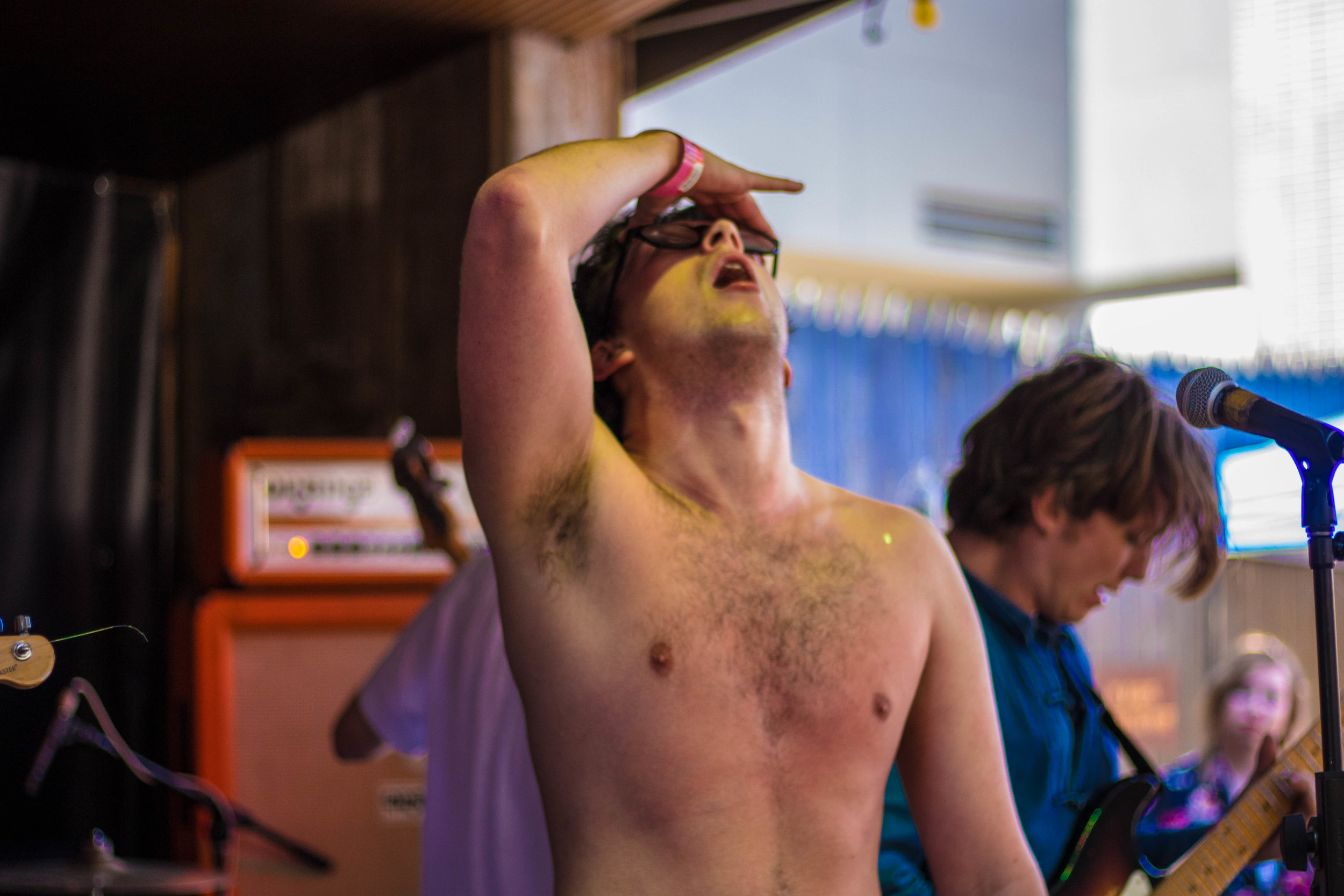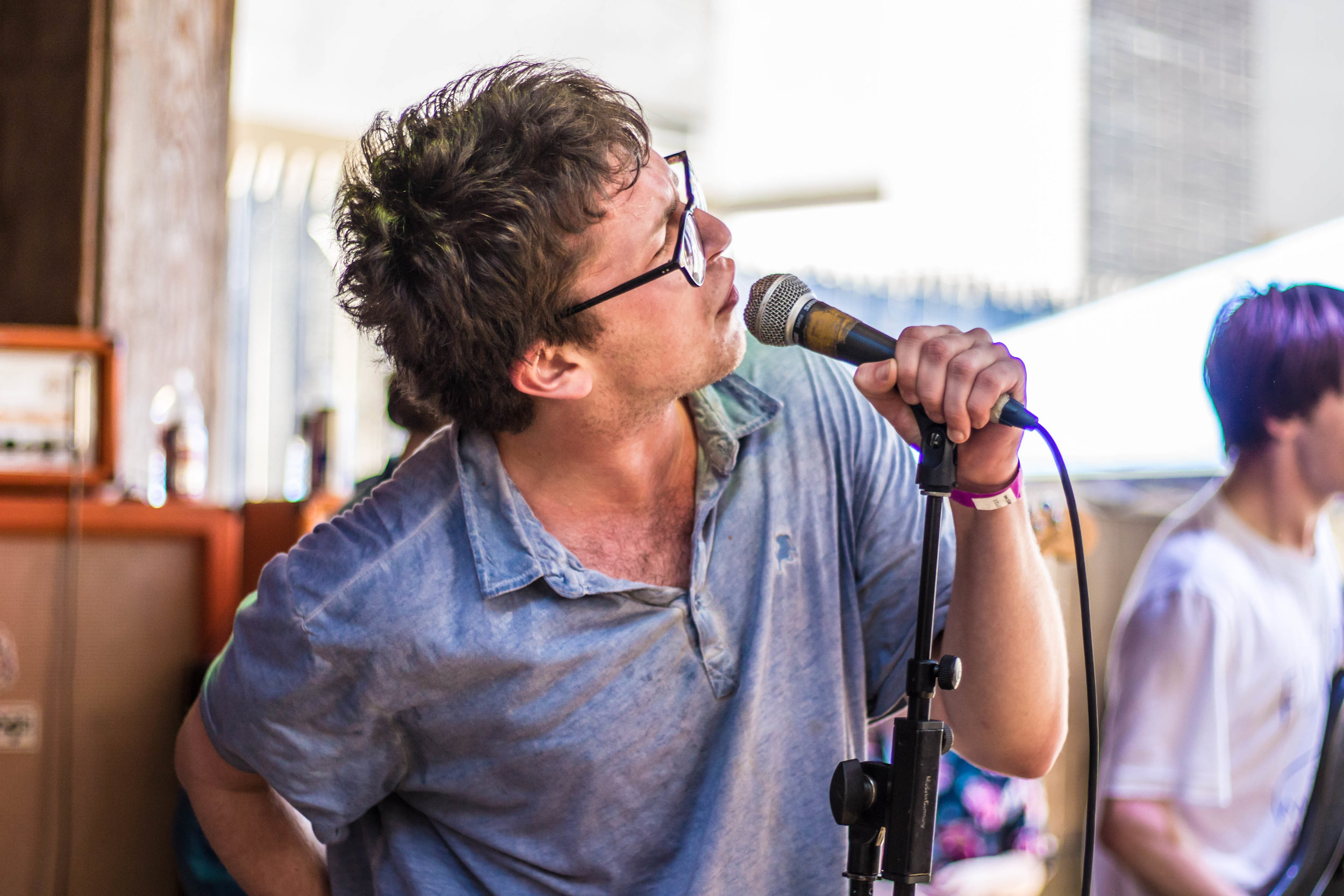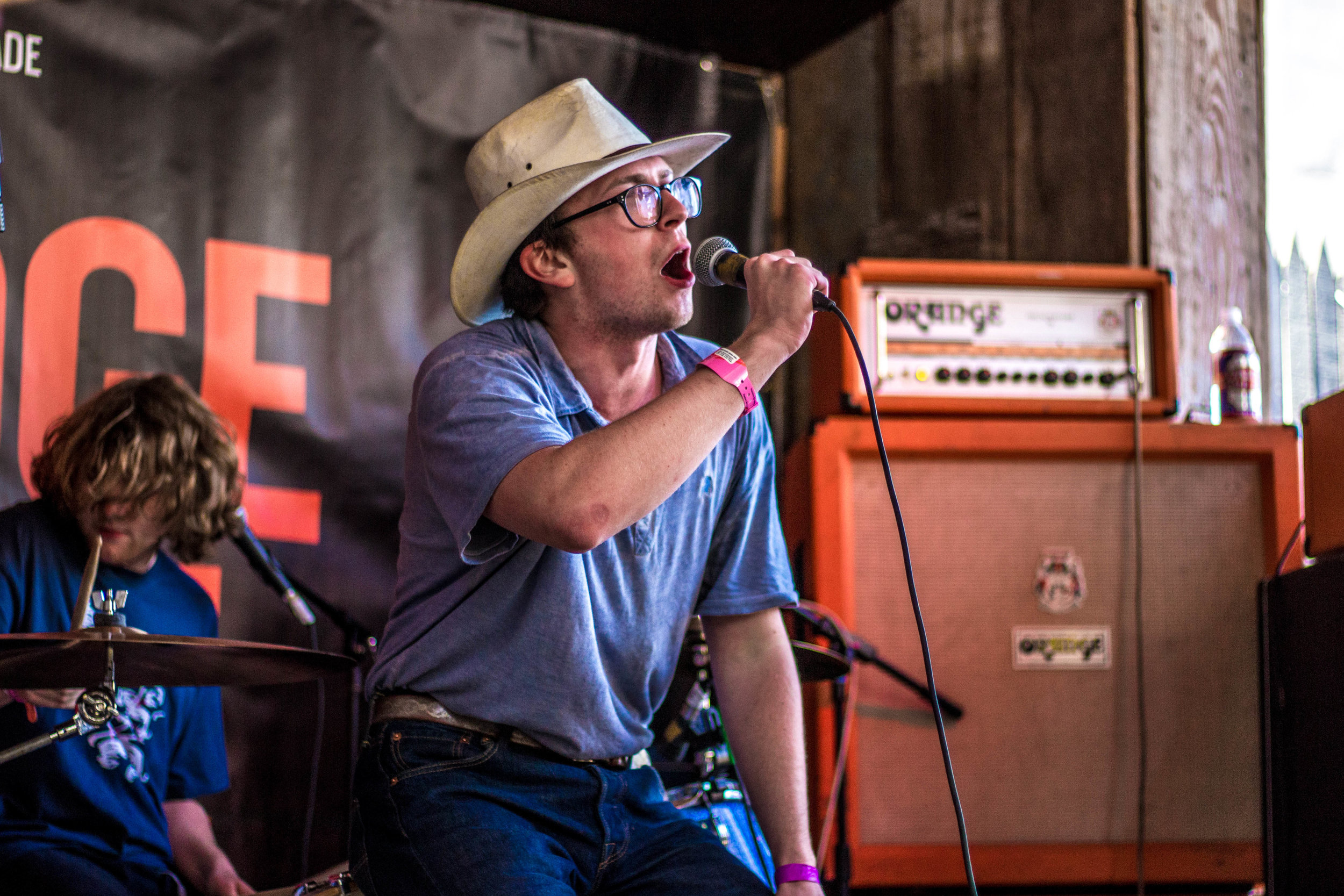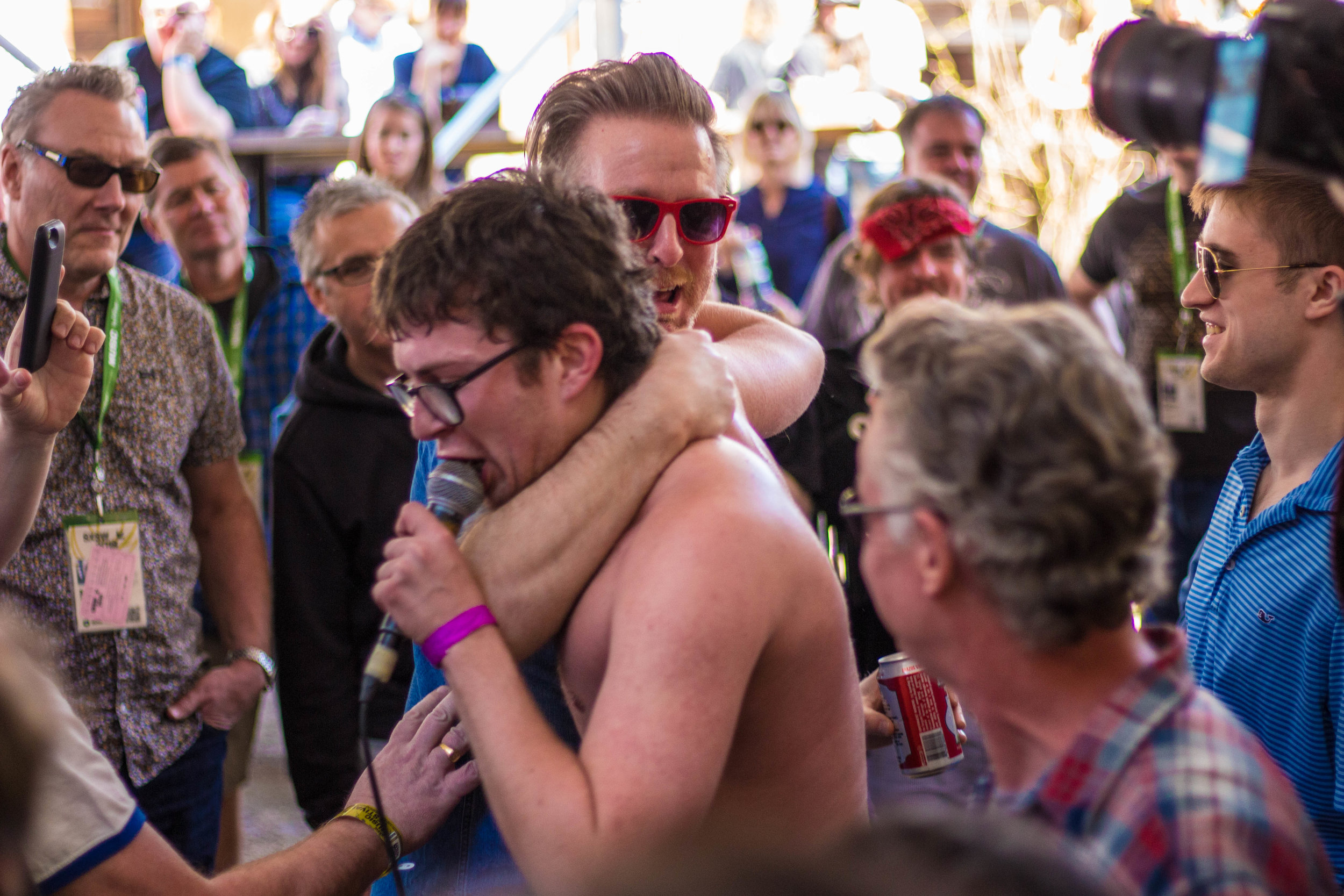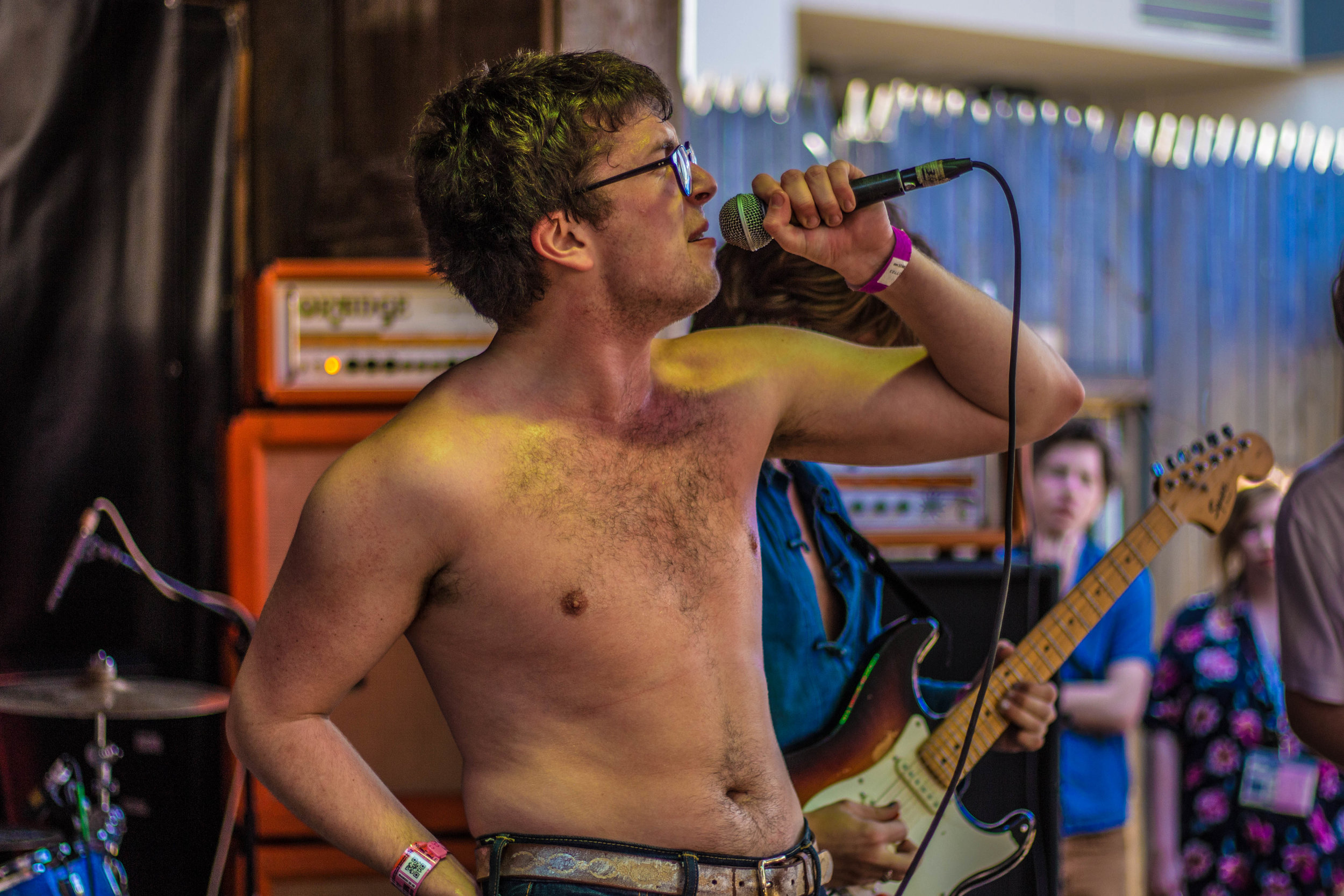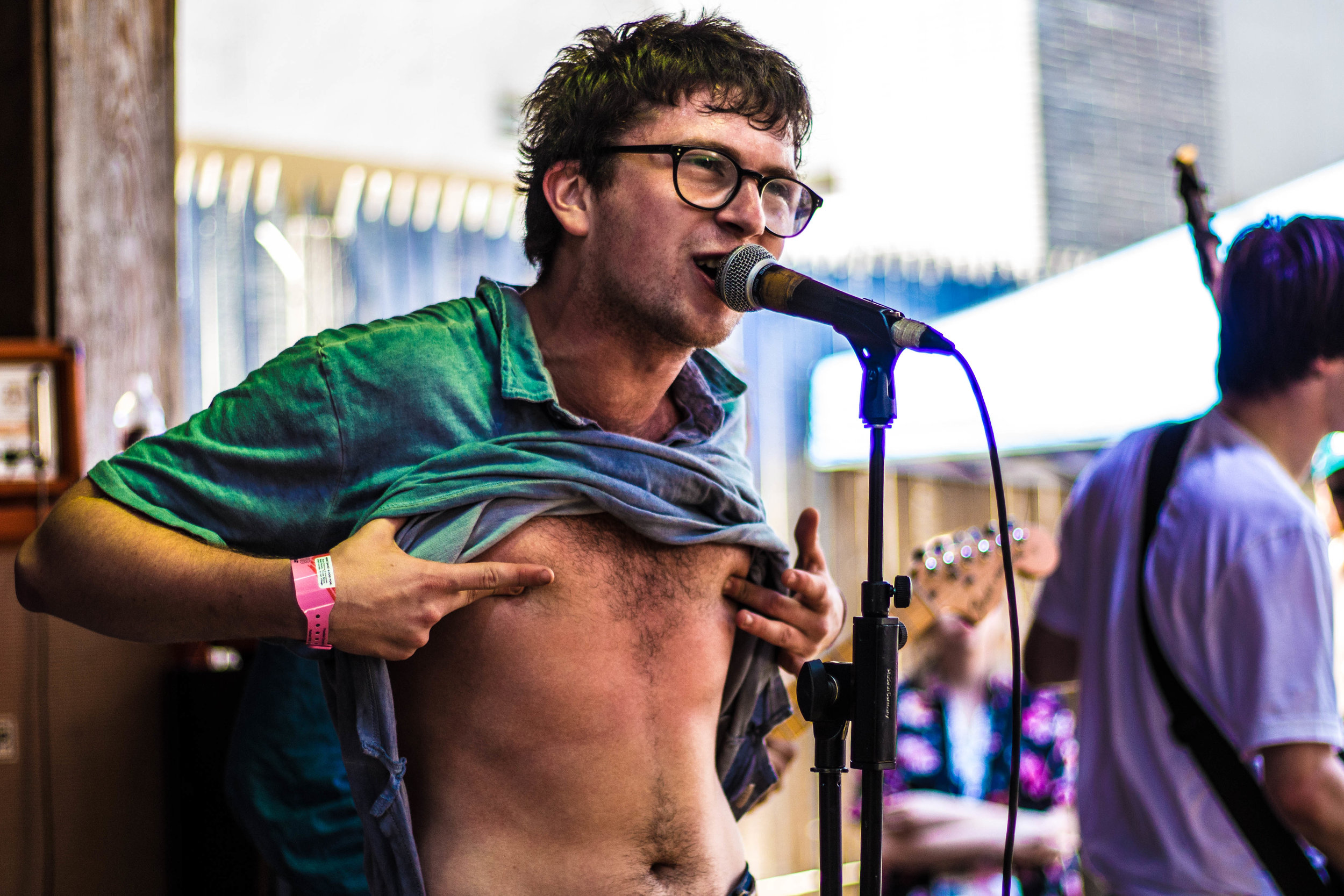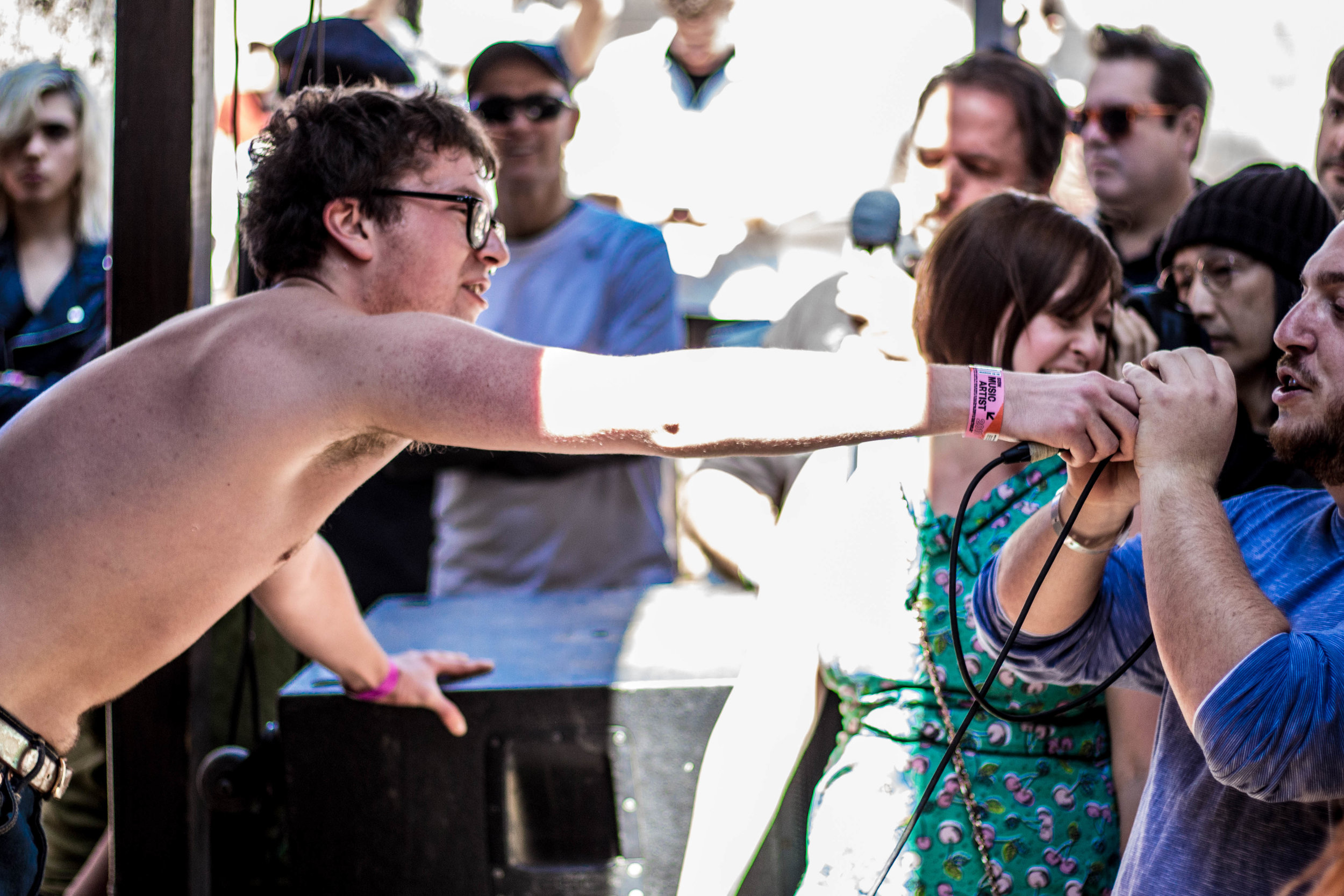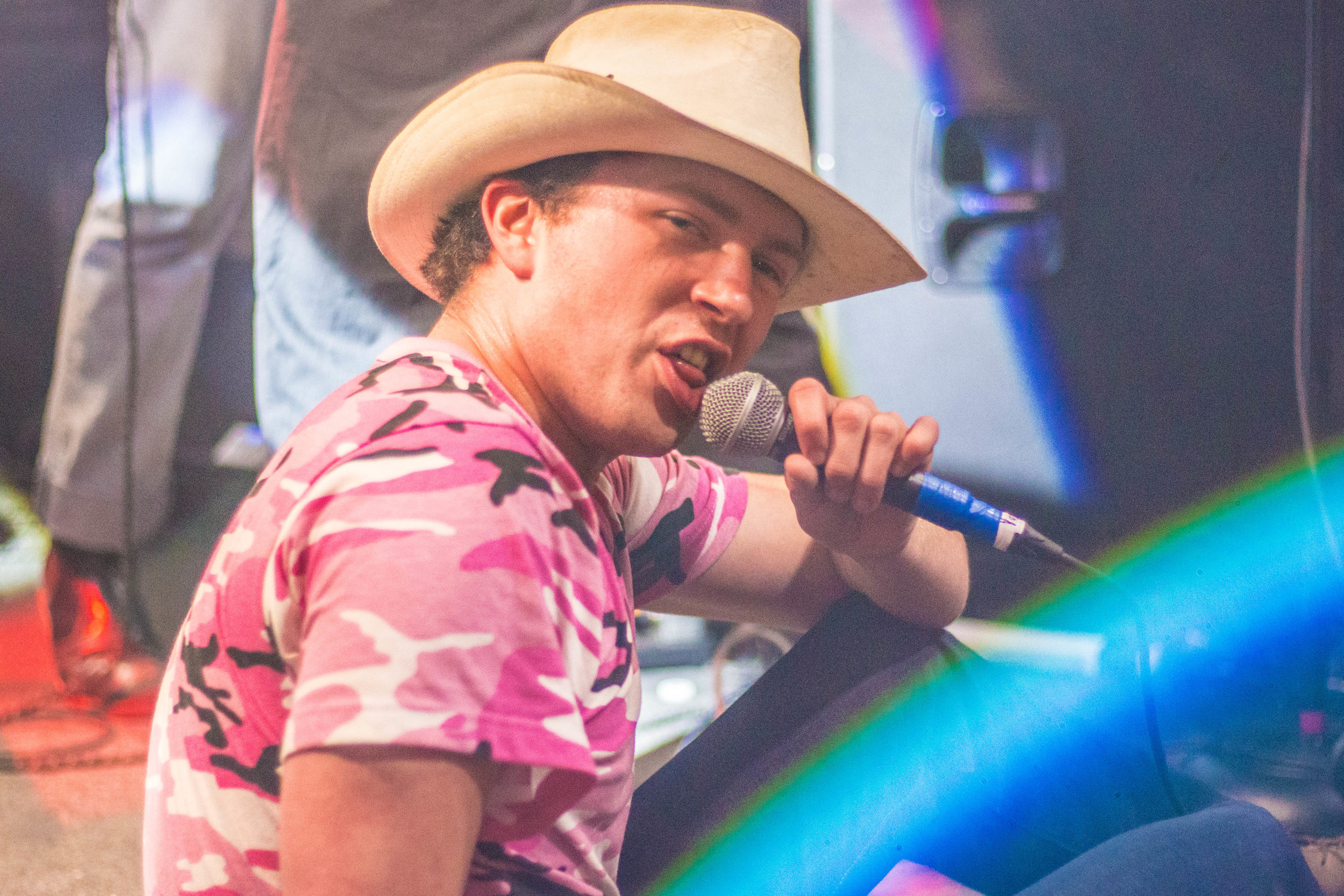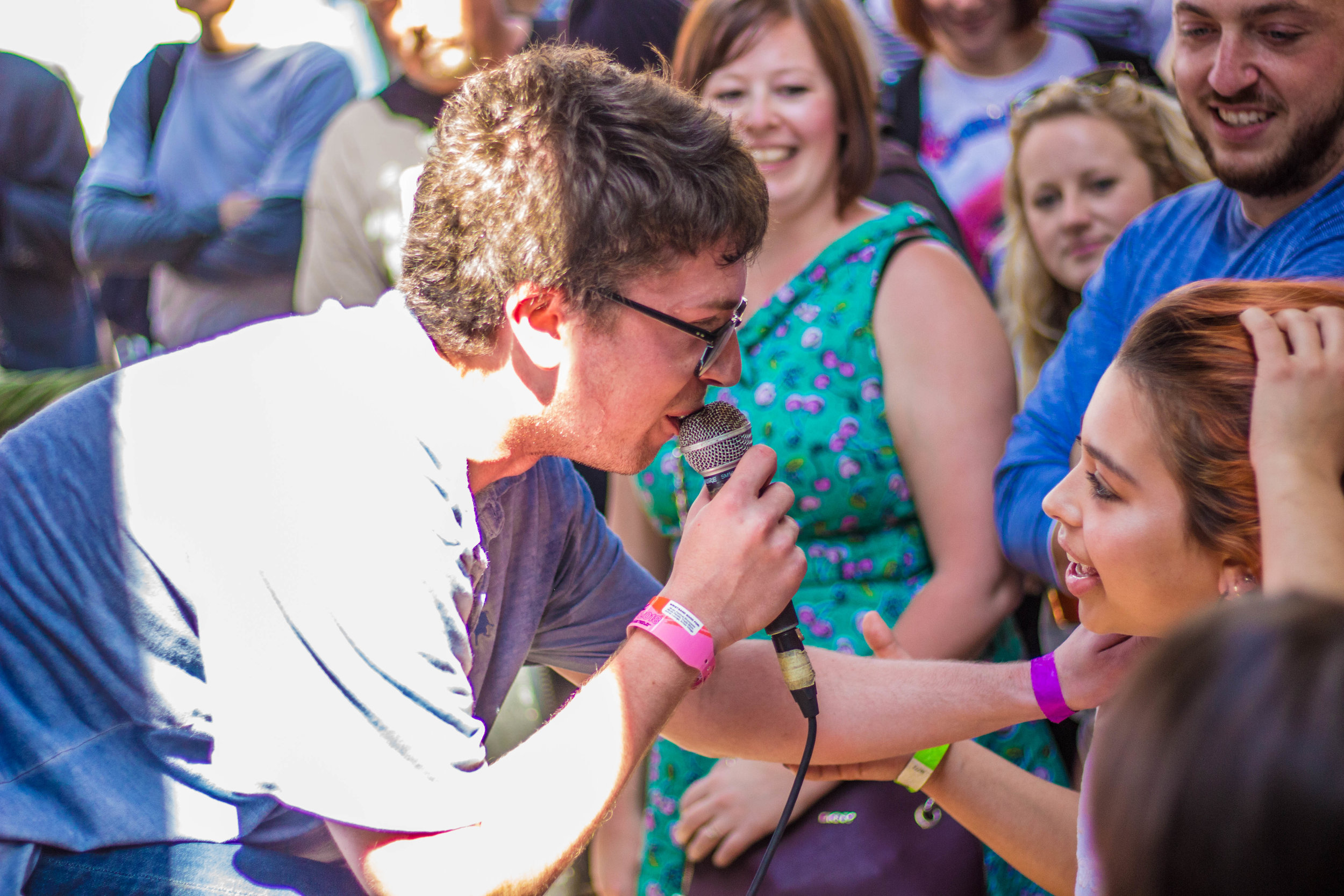Get To Know: Shame
If you've ever attended SXSW, you know that it's not like any ol' regular music festival with set stages and scheduled performance times; There's super official secret shows with big name artists, last minute pop up shows, unofficial showcases by new artists in the most random places around town, and multiple sets by the same artists in a single day. This past March, I finally attended my first ever SXSW and quickly learned just how unconventional this festival can be when I found myself interviewing Charlie Steen of the British punk band Shame at 1 AM after my friend had just cut his hair (as well as his bandmates' hair) into a mullet.
Easily one of the buzziest bands at the festival, Shame has been soaring high since the January release of their debut album Songs of Praise, which has in fact been receiving endless praise from listeners around the world. This summer, Shame will return to The States to play a handful of dates, including a show at Chicago's Empty Bottle as well as the annual West Fest street fest. Before they return to Chicago in July, get to know the band better by checking out these six facts I learned while chatting with Steen earlier this year.
Photo by Holly Whitaker
They Recorded in the Legendary Rockfield Studios
With the amount of buzz they've garnered and the sheer amount of gigs and festivals Shame has played, you might be surprised to find out that the members of Shame are only 20 and 21 years old. Before they started touring heavily, the band worked on writing their debut album for a few years, starting at the ages of 16 and 17. "We were still in school, and we recorded the album when we were 20," Steen says.
Talking about the process behind writing the album, Steen continues, "Lyrically, it was about personal sort of things you experience in that time as well social observations. Musically, it was influenced by what we were exposed to in that period. All the different bands we discovered through just being that age and being into music." Once they had written the album, the band took a trip to the iconic Rockfield Studios in Wales to record the tracks. "It was kind of like rehab," Steen says about the middle-of-nowhere location of the studio, where they resided for ten days. "We’re quite bad at distractions. So, we were on a farm, and this place is like a historic studio. Oasis, Black Sabbath, Motörhead, Led Zeppelin, all these people recorded there. Not many people go there now...Because everyone seems to just record with their laptop or a studio in London," he says, pausing to describe the scene. "You have like a farm, and then you have a house up top. That’s where we stayed, we each had our own room. Then you walk past the stables and stuff like that and there’s a recording studio. I was up at the house, and I did all of my vocals in my bedroom with a bed sheet over me, onto an Apple Mac. The rest of the band, they did everything to a click [in the studio]."
Prior to their work at Rockfield Studios, Steen recalls working their way through several different producers in order to finally get the right fit with Dan Foat and Nathan Boddy. "I’m not a musician, so I don’t want to put my foot in a shoe that won’t fit, but before that, we’d worked with eight different producers. They all had done the same method of 'you’re a live band, let’s try to make you sound like some punk band from the 80's where you record it live.' That wasn’t how it worked best. Dan and Nathan are from an electronic background, techno producers...They did it a completely unique and different way. Like Charlie, our drummer, he recorded his drum kit individually, each song. They saw it in the same way that fits our music, where the bass and the drums are the pulse and that was very important," Steen says. "We then realized through trial and error that the best way to approach it for us, was to try to create something completely different to our live sound. So they’re two different things. Sometimes people say it sounds like it does live, but to us it’s a great difference than how it sounds on the record. It’s a lot more concise," he continues.
They Admit Their Music is Derivative, But They Still Enjoy It
One of the most compelling features of Shame's music is the incredibly raw, honest quality of their songwriting. Reflecting on their style of writing, Steen says, "With the type of music we’re doing...we’re a guitar punk band in 2018. We’re very aware it’s very derivative. There’s no way we could ever deny that. I think with us--I’ve said this before, with bands and artists we might be compared to, and those that might have heavily influenced us, we’ll never have been able to experience it. That’s amazing for us. When we get to see bands like Goat Girl and Sorry and stuff, it’s amazing that we can experience it. For us, it does feel new and refreshing." Ultimately, they were never trying to be someone else when they started writing, and they're still just trying to stick to their own vision. "At the end of the day, we never did this with dreams of like having 5-star hotels. It wasn’t ever manufactured. It was all just part of the process. We are just very passionate about music and we know that it’s been done before, but we enjoy doing it. I think the main thing is we don’t write music for anyone other than ourselves. At the end of the day, this is entertainment and we really enjoy it. We’re having a laugh," Steen adds.
In addition to being authentic, Shame strives to keep their sound and vision multifaceted. "I think one of the preconceptions of a punk guitar band is aggression. Which you know could be lost in translation from energy or passion, or humor at times. That’s something we want to separate. Of course there are issues we’re angry about, but we don’t want to be a band that just conveys one emotion. That’s not human. We want to be able to express humor and melancholy," Steen says. As they keep pushing to diversify their sound, they also keep pushing themselves to grow and adapt. "We’re very self aware. When we did that album we were teenage boys...that was when we wrote that album. We know now that a lot has changed in our personal lives, which also reflects in the general absurdity of being in a band. It’s just a weird life to live. You feel very temporary. At all times. We basically just want to adapt and evolve. We don’t wanna write the same songs we did before," he says, adding that their constantly changing environment deeply affects them as a band and as people.
“We know that it’s been done before, but we enjoy doing it. I think the main thing is we don’t write music for anyone other than ourselves.”
Their Rehearsal Space Led Them to Discover Music in a New Light
In addition to recording in a legendary music space, Shame also first formed in the rehearsal space of the legendary Queen's Head in Brixton, which is where the likes of Fat White Family rehearsed as well.
Steen attributes their early rehearsal space to some of their current habits as music fans, saying, "When we started in the Queen’s Head...This is one of the differences; Before, we’d grown up going to venues like Brixton Academy, really large venues like that and seeing bands who had already established themselves in a position of accomplishment. When we went to go to the Queen's Head, personally I was able to discover bands who were playing a lot more intimate settings. Not known world wide. The realization that great music exists with an accessibility to a more intimate setting is a sort of relief."
"These were bands who, you say what you want them about personalities, but they were characters. It wasn’t just some pop culture. When you grow up and you’ve only ever seen the bands who perform on a platform of success, you can sometimes overlook the reality of a lot of situations. Of course everyone grew up listening to The Ruts and Stiff Little Fingers. So we knew about these bands, but to get to know them. You realize they’re people. And I think their intentions to do whatever the fuck they wanted...they’d gone past the point of remorse. Which was the best thing about it," Steen continues.
Their Stage Presence is Just an Amplified Version of Themselves
The same sense of authenticity that Shame's music has transfers over into their live shows; at SXSW, Steen often told their audiences to loosen up and smile, saying "this is entertainment." Steen says he never feels intimidated to get up onstage and deliver such a transparent show. "When I was younger, and I say younger as in like a year ago, I definitely had idolized a lot of people. Then I found that to be quite damaging because you gain this obsession and sort of like--" Steen pauses and snaps his fingers, trying to think of the best way to phrase it. "It’s unattainable identity. At that period, when we play, it’s definitely to an extent a persona. It’s who I am, but amplified," he continues.
Essentially, their stage presence will continue to remain an extension of themselves. Steen muses further on the concept of immense stage personalities, saying, "When I would look up to all these people like Iggy Pop or Lou Reed or whatever like, it was always...if you’re constantly comparing yourself, that’s what I found damaging. I think like I was saying, I don’t believe anything can be separated from context. At this age as well, you’re in the middle of this identity crisis, so you want to absorb all of these different personalities and be these people you obsess over. Then it got to the point where I’d just rather be myself. I was just this chubby, shy stoner as a teenager. When we used to play, that was the whole point: If you’ve been insulted so much your whole life, what have you got to lose?"
Touring Has Taught Them Their Limits
Shame just finished another UK and European tour after returning from a North American run, which saw them playing upwards of five shows in a day at this year's SXSW, but believe it or not their recent touring schedule is nothing compared to the previous year. "Last year we did like 140 gigs and 57 festivals in 3 months, like whilst recording an album and doing 5 tours. By the end I got a bit broken mentally," Steen says. "It’s hereditary but I suffer from anxiety so now I can only speak for myself...On the road, I don’t drink as much and don’t do drugs as much as we used to. Every night used to be a party. I sound like an old man," he laughs. "I feel like an old man. So that’s how I kind of deal with it."
Their intense past experiences ended up acting as a learning experience, where Steen personally discovered where his breaking point is. "The period of what I went through in December, where we ended up having to cancel this tour in Germany, I learned a lot more about myself than I have in my entire life. So I know when is too much. I know when I need a good night's sleep. Like I need a good night's sleep now, but it’s a celebration. I know what I need to do. I guess I sort of learned the value of responsibility a bit more. As a person, and this is a little bit hypocritical of me to say after saying that, but I can’t do moderation. I can’t do it at all. So I know that if I have one drink, I won’t drink until I fall asleep. And I can’t do one line. I’ll do it until it runs out. I can’t do that. If I’m not doing that, I can’t do anything. So it’s either one or the other, but that’s me as a person," he says.
While Steen may have personally learned to rein in his limits, he also realizes as a band they have to compromise sometimes. "We’ve known each other since we were kids. Sean has been my best mate since we were 8. We understand each other very well. I don’t particularly like playing a lot of shows, for my own personal reasons. If the rest of the band wants to do it, you have to find a middle ground. After what happened we're looking through a sharper lens about how many gigs we do. So like this festival season we slashed loads of festivals cause it’s not worth flying from Poland to play to 40 people in Kent to fly back to the Ukraine the next day."
As far as the biggest lesson that Steen has learned about the band through the years, besides learning his limits, he says, "You kind of lose a lot--this might sound very dramatic, but you kind of lose a lot of human rights. And by that, I don’t mean like I’m shackled in chains in a 4x4 room. I mean, in terms of you kind of lose the things that make you feel human. Eating a meal with your mum and dad or like going for a drink with your friends. You lose people you love, your friends and family. It sort of disappears. Familiarity becomes an abstract ideology. I still don’t think I know a lot about myself. I think as people we know each other so well, we [the band] went beyond friendship about 2 years ago. It’s almost like a cult. I guess, I don’t know, you have to deal with everything you deal within a normal life, like breaking up with someone, moving out of home... you have to do that through the band. The biggest amount of privacy I get is when I go to the toilet. Fact. For 6 and a half weeks. So I think you lose privacy. But you know I’m saying all this and we fucking enjoy it and we love it. Whatever we have to lose at this particular moment in time, personally, I feel is because we want to do this. I want to do this. We want to do this to the best of our ability."
“At the end of the day, it’s the biggest bullshit that a person could say ‘I’m not political.’ Everyone has politics, it’s just whether or not they choose to share them.”
They'll Always Use Their Platform in a Positive Way
Through their music, social media, and even past interviews, the members of Shame have made it clear that they'll never shy away from standing up for what's right. At one of their shows at SXSW, Steen jumped off stage mid-show to tell off an audience member who had gotten aggressive with some of the other crowd members. Touching on their habit to speak out, Steen says, "As a person, and a white man, we don’t want to...I don’t want to be the spokesperson for any problem or any inequalities with girls, or race, or religion. But as a human being, I don’t understand how you could not want to support all these people and fight against any inequality. I think we all feel it’s disgusting for anyone who has any sort of platform to not [use it]."
Steen also reflects on the tendency of the press to label them as a political band, but says they never saw it like that; they just realize it's something that directly effects them. "At the end of the day, it’s the biggest bullshit that a person could say 'I’m not political.' Everyone has politics, it’s just whether or not they choose to share them. How could you not talk about it? I don’t know, it doesn’t really make sense to me. There are a lot of great bands who will speak on these issues, and I think particularly in the current climate, in the music industry, and every industry, but this is the one we’re most absorbed in because this is our life." He continues, shouting out people like Princess Nokia who speak out on all these issues, adding, "As a guy, like who is constantly surrounded by the music industry all the time, it is without a doubt and without question, majority middle class, white men. That’s how it’s been for probably just under 100 years. With the birth of pop culture, all of these unforgivable acts of discrimination were erupted that weren’t extinguished. They shouldn’t have been there in the first place, but they should have been addressed and destroyed when it came out."
Lastly, Steen asks that everyone remains respectful of others when they come to shows, especially one of their gigs. "At a guitar gig, like a mosh pit, it’s mainly like male aggression taken out. We don’t fucking want that at our shows. Like it’s a safe environment. I’ve never won a fight, I’ve only ever been beaten up. Honestly. We’re not the jocks, we’re not the cool kids, we’re the people who just want to enjoy ourselves and we want everyone else to enjoy themselves as well. It’s not fucking hard, it’s not a lot to ask. If you’re an asshole, don’t come to our show."

